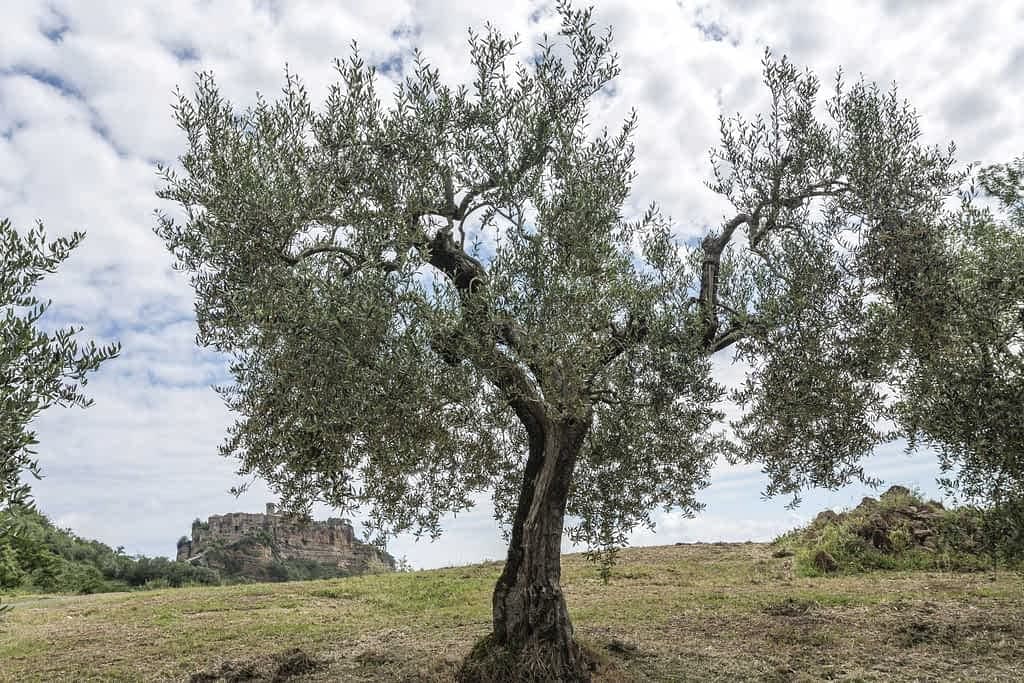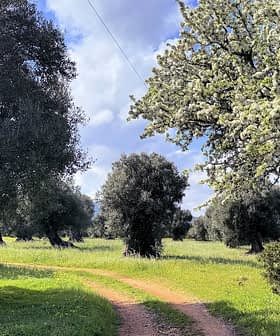The Art of Permaculture in Central Italy
The advice of a friendly neighbor inspired the founders of the Italian company Carma to choose a sustainable path to success.
 Boston Ivy on Carma's mill allows light in the witner and provides shade in the summer. (Photo: Carma)
Boston Ivy on Carma's mill allows light in the witner and provides shade in the summer. (Photo: Carma) Developing a successful organic permaculture regime takes time, but the producers behind Carma have achieved an award-winning formula.
The central Italian producers earned two awards at the 2023 NYIOOC World Olive Oil Competition – Gold and Silver for a pair of medium-intensity blends.
We believe that in the long run… (permaculture) will be (profitable). But if you want to make money quickly, my suggestion is to invest at the New York Stock Exchange. The success of a philosophy has no price.
The time it took them to reach the NYIOOC is in line with their company name, which became their identity and a goal after the company was founded in 2000.
The three founders named their new business Carma following a neighbor’s advice to do things calmly, or in his words con carma… molta carma.
See Also:Producer ProfilesThe trio had big plans, but their neighbor was telling them not to be in a hurry because, in nature, good things come to those who take their time.
Carma founder and chief executive Giulio di Gropello told Olive Oil Times they are very selective in the extra virgin olive oil quality contests they choose to enter.
“The basic idea is really to have our work evaluated by outsiders to confirm the correct pattern of our philosophy corroborated by the analysis that we make of our products,” Di Gropello said.
“It is important for us to have a reliable outside organization evaluate the result of our efforts,” he added. “In this respect, we have analyzed the NYIOOC’s work over the years and established that their feedback would be important for us.”
However, sustainability is more than a marketing strategy for the founders of Carma, who adopted a permaculture philosophy from the outset.
“We analyzed a report by Greenpeace over 35 years ago. We knew what was coming,” Di Gropello said, referring to climate change.
The founders decided on the permaculture route based on their belief that nurturing the natural environment handed down by their ancestors would make a small impact on climate change but serve as a prominent example to others.
“We use very little fertilizers, which are obviously organic,” he said. “But also on the packaging, we use only natural products such as paper and glass, no plastic wherever feasible.”
“We know that sending our products all over the world produces carbon dioxide,” Di Gropello added. “So even if we start with very low emissions in the production stage, once the products reach their final destination, carbon dioxide has been produced.”
As a result, the company restricts the number of clients it sells, instead opting to send larger volumes to fewer destinations to reduce emissions.
“Climate change is a fact; nature will cope, but we must make the maximum effort to reduce emissions,” Di Gropello said. “The same philosophy applied to the construction material that we use in our hospitality project.”
“In practice, we never touch the land where our olive trees are located,” he added. “We never touch the nature surrounding the plantations, maintaining the diversity. We reutilize all the branches pruned from our olive and other trees by fragmenting them and leaving these in the land to fertilize it.”
The company also uses the solid byproducts from the olive milling process – olive pomace – as a natural fertilizer for the trees.
“We naturally have a very fertile land, although it takes many more years than using – even organic – fertilizers,” Di Gropello said.
Carma also relies on donkeys to cut the grass, opting for a natural symbiosis instead of fossil fuel-powered tractors.
“They clean and fertilize the land naturally,” Di Gropello said. “The trees are much happier, and so are all the fauna and flora on the property.”
He added that the company’s groves are more fertile as well. “We believe that, in general, the whole process is more harmonious, a prerequisite to making a great product,” Di Gropello said.
Along with promoting sustainable agriculture, Di Gropello indicated that the company’s permaculture practices are reflected in their extra virgin olive oil, which reached 500 micrograms of polyphenols per kilogram for the first time in 2022.
He explained that all products bought from external sources to improve the quality and health of land and trees impact carbon dioxide levels.

Traditional olive cultivars grow in the central Italian groves of Carma.
“If you can obtain the same result with no external intervention naturally, although it takes time, it will be better,” Di Gropello said.
Di Gropello’s vision for Carma was inspired by a painting he saw many years ago in an art gallery in London.
When Di Gropello was working there as a stockbroker in 1978, he used to visit art galleries over weekends. He was particularly inspired by a painting by artist J.M.W. Turner called Italian Landscape, probably Civita di Bagnoregio, which portrayed an extraordinary and untamed landscape.
Di Gropello decided to visit Civita di Bagnoregio in Italy’s Lazio region as soon as possible. When he visited a few years later, he met the Pizzo family, who owned a ruin that they used to shelter their animals and harvests.
The Pizzos sold the ruin to Di Gropello while they continued tending to their Leccino trees on the adjacent property. Di Gropello renovated the building, and the Pizzo family worked on their goal to become extra virgin olive oil producers.
Di Gropello learned about oliviculture from the Pizzos. Their youngest son Gianluca assisted Di Gropello with making extra virgin olive oil.
Di Gropello realized that controlling the production process was essential to producing superior-quality oil. He would need his own olive mill, but this would only be economically viable if he owned more trees.
The opportunity presented itself in 2000 when abandoned land with about 600 trees came up for sale nearby. Together with the young Pizzo and Henry Charles Scio (who pulled out a few years later due to time constraints), Di Gropello founded Carma.
Di Gropello’s dream of Carma’s olive press became a reality. “Our mill has been built underground to take advantage of the natural temperature,” Di Gropello said.
The façade faces the west and is made from transparent glass blocks, invented by renowned architect Renzo Piano, who designed the Maison Hermès, a building in Tokyo, using the same bricks.
Carma’s olive mill is covered with Boston Ivy, an Asiatic plant that is green in summer, red in autumn and dormant in winter. “So when we harvest, the mill is full of light, and we do not need electrical lighting. In the summer, we do not need air conditioning,” Di Gropello said.
Today, Carma has 7,000 trees in Lazio, Umbria and Tuscany, and some of their trees are centuries old.
“Our cultivars are typical of central Italy, mostly Leccino, Frantoio, Moraiolo, Maurino and some autochthonous varieties where the name has been lost over time,” Di Gropello said.
“Out of this, we produce a monocultivar, two blends and a super blend every year,” he added.
Ten years after Carma was founded, as a means to have the quality of their extra virgin olive oils evaluated, they started submitting samples to be ranked in respected extra virgin olive oil guides.
In 2017, they started participating in international extra virgin quality contests, winning their first award at the AVPA Paris contest.
Di Gropello said they believe being listed in olive oil guides and winning awards does not make a big difference from a commercial perspective because consumers evaluate a food product based on flavor.
“But for us, it is very important to have an outside specialist point of view,” he said. “Extra virgin olive oil producers are always convinced they are producing the best product. We believe that there is always a margin for improvement.”
Carma celebrated its 20th anniversary in 2020, commemorating Di Gropello’s love for art and the environment. The company asked three artists to create twenty artworks and to choose three projects focused on sustainability to donate the proceeds of the sales of their works.
Di Gropello described the project as successful; all the pieces sold, and the celebration also proved the economic sustainability of Carma’s permaculture philosophy.
“We believe that in the long run – all farmers have a long-term view – it will be,” he said. “But if you want to make money quickly, my suggestion is to invest at the New York Stock Exchange.”
“The success of a philosophy has no price,” he concluded.








